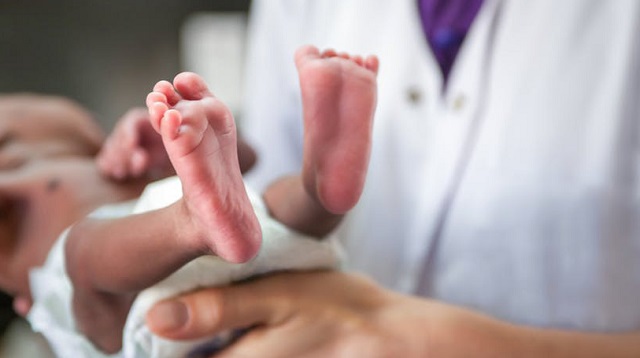
Kampala, Uganda | THE INDEPENDENT | It is a bright Saturday afternoon; Elian Asio (not real names) sits under a tree holding her nine-month old-baby. The baby is shivering with fever and cough.
The 16-year-old, Asio says she doesn’t have money to take her to hospital for treatment. Asked why the father doesn’t take responsibility, Asio poses for minutes perhaps to get a befitting response. She wipes her teary eyes and bends her head.
“He doesn’t have money. I rarely see him,” Asio says. According to the teenager, she conceived through rape in November 2017. According to Asio, it started when she was invited by her classmates for a girl’s talk.
She explains that upon arrival at her friend’s home, she found two boys who informed her that her friend had just left but would return shortly. The boys allegedly offered her a seat but out of the blue, they dragged her into a room where they took turns to rape her.
She explains that one of the boys stood outside the room perhaps keeping watch for the brother who was raping her inside the room. Asio returned to her home and narrated her ordeal to her parents.
“I reported the issue to my parents but they didn’t believe in me. They thought maybe I was lying or I wanted to play on their minds yet I had not willingly had sex,” Asio said.
The former pupil of Bukutu Primary School explains when her parents seemed unbothered about her woes; she lost the morale to report the incident to authorities.
She sat home and swore never to visit her friends anymore.
Her stomach started bulging. Being 14-years back then, she wondered what was happening to her stomach. Asio consulted an elderly woman who told her the bulging stomach was a sign of pregnancy.
A few months later, her parents also noticed changes to her body shape. They sat her down and she reminded them of the incident they ignored.
Her father asked her to lead him to the boy who had raped. Asio says her parents and the rapists negotiated and resolved that they would take responsibility of the pregnancy and child.
A study by the United Nations Educational, Scientific and Cultural Organisation (UNESCO) on Early and Unintended Pregnancies (EUP) in Eastern and Southern Africa (ESA) region shows three to seven girls aged 15 to 19 have given birth or have ever been pregnant.
Dubbed situational analysis on Early and Unintended Pregnancy in Eastern and Southern Africa region, the UNESCO report shows Namibia leads countries with the highest cases of EUP with seven out of 10 girls aged 15 to 19 years having been pregnant.
Lesotho, Kenya, Zambia and Uganda come in second, third, fourth and fifth in EUP cases respectively.
In Uganda, Malawi, Tanzania, Zambia and Zimbabwe, according to the UNESCO analysis conducted by a group of academia including Dr. Michael Jana, Dr Renay Weiner and Ms Monica Longwe, under the supervision of the regional Director Prof Hubert Gizjen, shows that 25 percent of the girls in rural areas were pregnant by 18 years of age.
This translates into three out of every 10 girls in rural area getting pregnant before 18 years.
“In most countries, pregnancy rates were higher in rural than urban areas, with particularly large differentials in Tanzania, Zimbabwe, Lesotho and Zambia. Minimal urban differences were noted in Kenya and Swaziland,” reads the report.
The report was recently presented to ministers of education, health, legislators and journalist at capacity building conference in Johannesburg South Africa.
The study confirmed that drivers of EUP in ESA region among others include poverty, lack of access to sexuality reproductive health rights that include contraception and cultural norms that support child marriage.
“It is therefore crucial that investments in preventing and responding to EUP in the region are intensified and that effective strategies are adopted.
This needs to include a shift from national policy to localizing policies at school level, with enough advocacy to ensure understanding and acceptance without stigmatizing girls who are victims of unintended pregnancies,” Monica Longwe recommends.
Just like Asio who is now breastfeeding with limited hope for the future, Prof Gijzen said focus should be enlightening girls that there is hope for school even after pregnancy.
Gijzen says when a girl gives birth in teen years and is not helped to resume school, it keeps her and family in a poverty cycle and that impedes efforts to achieving Sustainable Development Goals (SDGs) 2030.
UNESCO warns that it is a wrong decision to force girls to get married to boys who make them pregnant because they don’t have capacities to make them lead a better life. This coincides with Asio’s life whereby her rapist turned husband was young and has no financial means.
But she survives on the mercy of her father and mother in-law who contribute whatever they can afford for the wellbeing of their grandson. Uganda police annual crime reports show 47,746 girls have been defiled in the last three years translating into 15,915 girls defiled every month and 43 on a daily basis.
The 2018 statistics show 201 girls were defiled by people living with HIV in 2018, 115 were defiled by guardians, ninety-five pupils by their teachers, 90 secondary school students by teachers, 90 girls with disabilities were defiled and 84 girls by their biological parents.
Asio advises girls to always move in a group when going to visit their friends. She believes moving more than one would be easier to defend self in case a man tries to rape one of you. She discourages visits to friends whom you are not sure of the people they stay with.
*****
URN
 The Independent Uganda: You get the Truth we Pay the Price
The Independent Uganda: You get the Truth we Pay the Price



